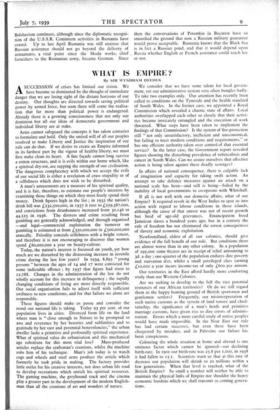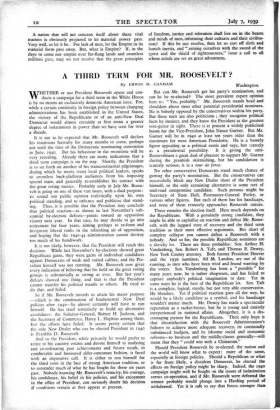WHAT IS EMPIRE ?
By SIR WYNDHAM DEEDES
ASUCCESSION of crises has limited our vision. We have become so dominated by the thought of immediate danger that we are losing sight of the distant horizons of our destiny. Our thoughts are directed towards saving political power by armed force, but soon there will come the realisa- tion that far more than political power is endangered. Already there is a growing consciousness that not only our dominion but all our ideas of democratic government and individual liberty are at stake.
Arms cannot safeguard the concepts it has taken centuries to formulate and hold. Only the united will of all our peoples resolved to make Liberty and Justice the inspiration of our rule can do that. If we desire to create an Empire informed in its farthest part by the vigour of healthy liberty, we must first make clean its heart. A fine façade cannot long survive a rotten structure, and it is evils within our home which, like a spiritual dry-rot, are sapping the strength of our civilisation. The dangerous complacency with which we accept the evils of our social life is either a revelation of crass stupidity or of a selfishness which does not wish to be disturbed.
A man's amusements are a measure of his spiritual quality, and it is fair, therefore, to estimate our people's interests by examining those things on which they most freely spend their money. Drink figures high in the list ; in 1932 the nation's drink bill was £232,500,000, in 1937 it rose to £259,387,000, and convictions from drunkenness increased from 30,146 to 44,525 in 1936. The distress and crime resulting from gambling are generally acknowledged, and through organised —and legal--commercial exploitation the turnover on gambling is estimated at from £350,000,000 to £500,000,000 annually. Frivolity conceals selfishness with a bright veneer, and therefore it is not encouraging to discover that women spend £60,000,000 a year on beauty-culture.
Today, the nation's interest is focussed on youth, yet how much are we disturbed by the distressing increase in juvenile crime during the last few years? In 1934, 8,895 " young persons " between the ages of 14 and 17 were convicted for some indictable offence ; by 1937 that figure had risen to 12,788. Changes in the administration of the law do not wholly account for this increase in delinquency ; the rapidly changing conditions of living are more directly responsible. Our social organisation fails to adjust itself with sufficient swiftness to new conditions, and for that failure we alone are responsible.
These figures should make us pause and consider the trend our national life is taking. Today 93 per cent. of our population lives in cities. Divorced from life on the land where man is " close enough to Nature to be prompted to awe and reverence by her beauties and sublimities and to gratitude by her vast and perennial benevolencies," the urban dweller lacks a primitive and profoundly spiritual experience. What of spiritual value do urbanisation and this mechanical age substitute for this most vital loss? Mass-produced articles replace the craftsman's creations, whilst the machine robs him of his technique. Man's job today is to watch cogs and wheels and steel arms produce the article which formerly he took pride in making. The factory provides little outlet for his creative interests, nor does urban life tend to develop recreations which enrich his spiritual resources. The gaming machine, the greyhound track and the cinema play a greater part in the development of the modern English- man than all the creations of art and wonders of nature. We consider that we have some talent for local govern- ment, yet our administrative system very often bungles badly. To take two examples only. Our attention has recently been called to conditions on the Tyneside and the health standard of South Wales. In the former case, we appointed a Royal Commission which revealed a chaotic state of affairs. Local authorities overlapped each other so closely that their activi- ties became intricately entangled and the execution of work thwarted. What steps have been taken to implement the findings of that Commission? Is the system of fire-protection still " not only unsatisfactory, inefficient and uneconomical, but failing to meet modern conditions and requirements," or has one efficient authority taken over control of that essential service? In the latter case, the Government report revealed figures showing the disturbing prevalence of tuberculosis and cancer in South Wales. Can we assure ourselves that effective action is being taken against these deadly scourges?
In affairs of national consequence, there is culpable lack of imagination and capacity for taking swift action. An attempt to take defence measures against air attack on a national scale has been—and still is being—foiled by the inability of local governments to co-operate with Whitehall. If all is not well with our domestic affairs, what of our Empire? It required revolt in the West Indies to spur us into action with regard to labour conditions in those islands, although the cause of that unrest was not of recent growth but bred of age-old grievances. Emancipation freed Jamaican slaves a hundred years ago, but in a century the rule of freedom has not eliminated the rotten consequences of slavery and economic exploitation.
Newfoundland, oldest of all our colonies, should give evidence of the full benefit of our rule. But conditions there are almost worse than in any other colony. In a population of 295,000 some 60,000 are in receipt of relief amounting to 3d. a day ; one-quarter of the population endures dire poverty and starvation diet, whilst a small privileged class earning £10,000 a year incurs income-tax of only £600 per annum. Our territories in the East afford hardly more comforting study than our Western Colonies.
Are we seeking to develop to the full the vast potential resources of our African territories? Or do we still regard them as the happy hunting ground of British sportsmen and gentlemen settlers? Frequently, our misinterpretation of such native customs as the system of land tenure and chief- tainship, the significance of a man's herds and primitive marriage customs, have given rise to dire errors of adminis- tration. Errors which a more careful study of native peoples would have made impossible. In the Near East our rule has had certain successes, but even these have been chequered by mistakes, and in Palestine our failure has been conspicuous.
Colouring the whole situation at home and abroad is one ominous factor which cannot be ignored—our declining birth-rate. In 1901 our birth-rate was 25.8 per 1,000, in 1938 it had fallen to 15.1. Scientists warn us that at this rate of decrease our population will shrink to 20 millions within a few generations. When that level is reached, what of the British Empire? So small a number will neither be able to maintain the physical links of Empire nor shoulder the heavy economic burdens which we shall transmit to coming genera- tions. A nation that will not concern itself about these vital- matters is obviously prepared to let material power pass. Very well, so let it be. For lack of men, let the Empire in its material form pass. away. But, what is Empire? If, in the days to come our empire over far-fiung lands and countless millions pass, may we not resolve that the great principles of freedom,. justice and toleration shall live on in the healts. and minds of men, informing their cultures and their civilisa- tion? If this be our resolve, then let us east off sloth. and banish inertia, and " arming ourselves with the sword of the spirit and the shield of righteousness," issue a call to all whose minds, are set on great adventures-











































 Previous page
Previous page